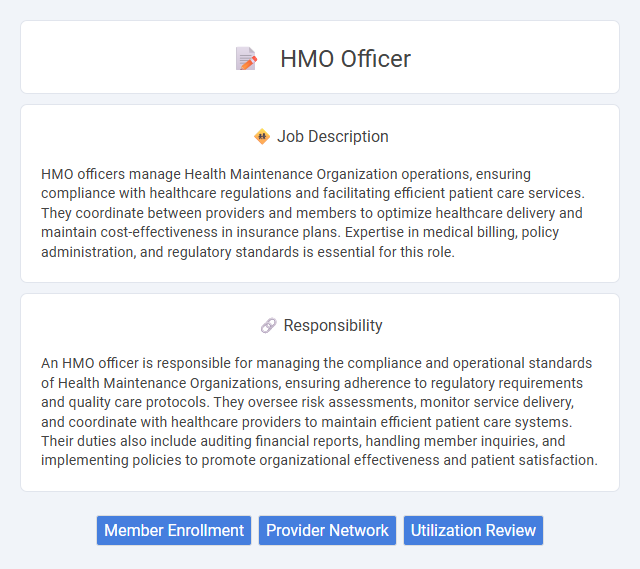
HMO officers manage Health Maintenance Organization operations, ensuring compliance with healthcare regulations and facilitating efficient patient care services. They coordinate between providers and members to optimize healthcare delivery and maintain cost-effectiveness in insurance plans. Expertise in medical billing, policy administration, and regulatory standards is essential for this role.
People with strong communication skills and an empathetic nature are likely to be suitable for an HMO officer position, as the role involves managing housing conditions and ensuring compliance with health and safety standards. Those who can handle stressful situations and make informed decisions based on regulatory frameworks may have a higher probability of success in this job. Individuals who struggle with attention to detail or resist enforcing rules might find this role challenging and less suitable.
Qualification
A successful HMO officer typically requires a bachelor's degree in health administration, public health, or a related field, along with certifications such as Certified Health Care Compliance Officer (CHCO) or Certified HMO Professional (CHP). Key qualifications include strong knowledge of health maintenance organization regulations, excellent communication skills, and proficiency in managing healthcare plans and provider networks. Experience in healthcare compliance, risk management, and data analysis enhances an HMO officer's ability to ensure efficient operations and regulatory adherence.
Responsibility
An HMO officer is responsible for managing the compliance and operational standards of Health Maintenance Organizations, ensuring adherence to regulatory requirements and quality care protocols. They oversee risk assessments, monitor service delivery, and coordinate with healthcare providers to maintain efficient patient care systems. Their duties also include auditing financial reports, handling member inquiries, and implementing policies to promote organizational effectiveness and patient satisfaction.
Benefit
HMO officers likely enjoy benefits such as comprehensive health insurance plans and access to wellness programs, which can enhance their overall well-being. They probably receive job stability and structured career advancement opportunities within the healthcare management industry. Employee benefits may also include paid leave and professional development support, contributing to job satisfaction and long-term retention.
Challenge
The role of an HMO officer likely involves navigating complex regulatory frameworks and ensuring strict compliance with housing standards, which can pose significant challenges. Managing tenant disputes and addressing safety concerns may require strong problem-solving skills and adaptability under pressure. The probability of encountering urgent situations that demand swift, decisive action is high, making resilience a critical asset for success in this role.
Career Advancement
HMO officers play a crucial role in managing health maintenance organizations by ensuring compliance with healthcare policies and optimizing member services. Career advancement opportunities include progressing to senior HMO officer roles, healthcare management positions, or specialized areas like claims auditing and quality assurance. Gaining certifications in health administration and mastering regulatory frameworks significantly enhance promotion prospects in the HMO sector.
Key Terms
Member Enrollment
HMO officers specializing in member enrollment manage the registration process for new members, ensuring accurate data entry and compliance with regulatory guidelines. They verify member eligibility, process enrollment forms, and maintain updated records in the health maintenance organization's database. Efficient handling of member enrollment directly impacts customer satisfaction and the organization's operational efficiency.
Provider Network
An HMO Officer specializing in Provider Network management ensures efficient collaboration between healthcare providers and the HMO to maintain comprehensive, high-quality service coverage. They analyze provider performance metrics, negotiate contracts, and expand the network to include diverse specialists and facilities that meet regulatory standards. Maintaining strong provider relationships and monitoring service delivery helps optimize patient access and satisfaction within the HMO framework.
Utilization Review
HMO officers specializing in Utilization Review conduct thorough assessments of medical services and treatments to ensure they meet established clinical guidelines and cost-effectiveness standards. They analyze patient records, treatment plans, and healthcare provider requests to approve or deny coverage based on medical necessity and policy criteria. Their role is crucial in optimizing healthcare resources, controlling costs, and maintaining the quality of patient care within Health Maintenance Organizations.
 kuljobs.com
kuljobs.com